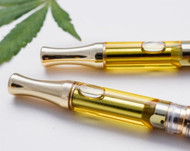Access to Legal Cannabis Associated with Decreased Risk of Lung Injuries
Apr 17th 2024
Contrary to the arguments of many anti-legalization advocates, a recent study has found no correlation between increased rates of cannabis vaping and rates of lung-injuries associated with contaminated THC or CBD vapes.
The collaborative study was conducted by investigators at Johns Hopkins, New York University, and the American Heart Association.
Using information from the 2019 Behavioral Risk Factor Surveillance System (BRFSS) and the Centers for Disease Control and Prevention (CDC), the team analyzed data from 13 states (7 with legal cannabis and 4 prohibition states) regarding the "prevalence of marijuana vaping, cases of e-cigarette or vaping product-use-associated lung injury (EVALI), and cannabis laws."
The researchers found that the prevalence of increased legal cannabis vaping was "not positively associated" with cases of EVALI, "even after accounting for cannabis state policies."
This means that even though more people reported vaping cannabis in states that have adult-use programs, it did not cause an increase in the percentage of EVALI cases compared to non-legal states.
Even more interestingly, there was actually an inverse association between state cannabis vaping and cases of EVALI, meaning that "states that had higher levels of marijuana vaping, which tend to be the states that have some form of legal access, saw lower lung injury rates."
The study's conclusions states that "state-level cannabis vaping prevalence was not positively associated with EVALI prevalence" suggesting that "the EVALI outbreak may have not necessarily been a simple reflection of state-level cannabis vaping prevalence but rather due to the use of contaminated or illicitly-sourced vaping products, which are more likely in states with restrictive cannabis laws."
"These findings, therefore, suggest that there may not be a direct, simple link between a state’s cannabis vaping prevalence and EVALI cases, but rather the relationship is likely more nuanced, supporting the CDC’s hypothesis that the EVALI outbreak is likely reflective of access to informal sources of THC-containing e-liquids," the study authors explained.
"Although cannabis vaping prevalence was low in states with prohibitive cannabis laws, individuals from such states may more likely obtain cannabis from illegal sources, increasing their risk of using contaminated products and hence the higher prevalence of EVALI cases in such states."
Rates of EVALI have dropped significantly over the past couple of years, as public education on proper safety and testing practices have helped regulators "step up" efforts to crack down on manufacturers that include harmful additives such as vitamin-E-acetate in their cartridges and vaping devices.
However, the study's researchers state that "continued surveillance of cannabis vaping is warranted," and "efforts to discourage black-market sales of contaminated products should be pursued to prevent future outbreaks."
Sources:

